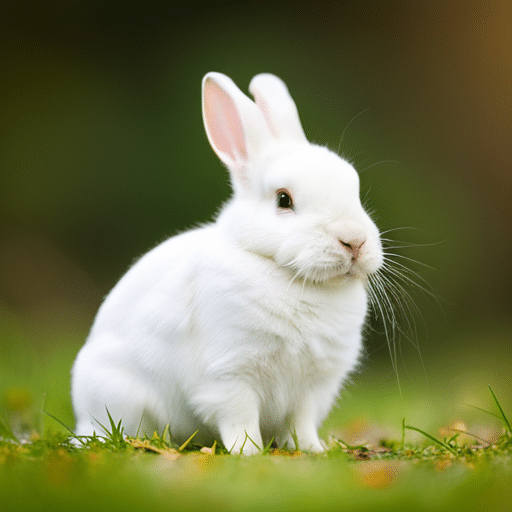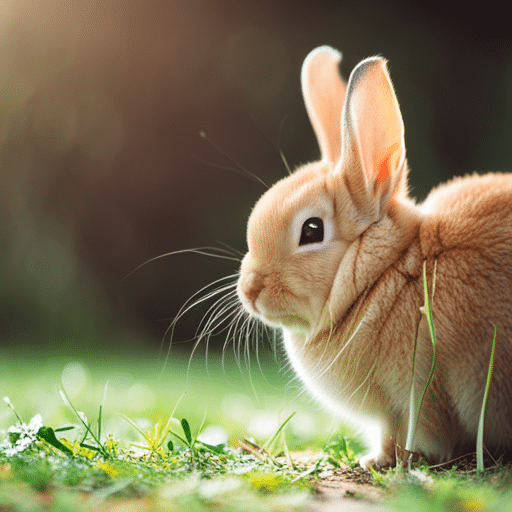Pet rabbits are beloved companions for many people and can bring a lot of joy to their lives. However, one concern that all rabbit owners must be aware of is the possibility of worms. Worms can cause serious health issues in rabbits if not dealt with quickly and appropriately. So do pet rabbits get worms? The answer is yes, they certainly can – but there are steps you can take to prevent it from happening or treat it if your rabbit does become infected. Let’s explore this topic further so you will know what to look for and how to keep your furry friend safe from harm.
Understanding Rabbits and Parasites

The most common type of worm that affects pet rabbits is called the roundworm. This type of parasite lives in the intestines unlike cats and dogs and can cause a variety of health issues if not treated properly. Other parasites, such tiny white worms such as tapeworms, can also affect rabbits but are much less common. As with any animal, regular checkups with your veterinarian are important to ensure that your rabbit is healthy and free of any parasites.
A Quick Overview of the Rabbit Digestive System
The digestive system of a rabbit is different from that of other animals. They have much shorter intestines, which can make it difficult for them to digest some types of food or break down parasites they may have ingested. This means that rabbits eat and are incredibly susceptible to becoming infected with worms and other parasites.
Common Parasites in Rabbits
The most common parasites that can affect rabbits are roundworms, tapeworms, and coccidia. Roundworms are stomach worms that live in the intestines and can cause diarrhea, vomiting, abdominal swelling, anemia, poor growth, and weight loss. Tapeworms also live in the intestines and can lead to similar symptoms but may additionally cause itching around the tail or anus. Coccidia are microscopic parasites that live in the intestinal cells and can cause diarrhea, vomiting, anemia, weight loss, and dehydration.
Do Pet Rabbits Get Worms? The Science Behind It
Scientists have studied how rabbits become infected with parasites. Most of the time, these parasites are ingested from other animals or through contaminated food and water. Rabbits that live in outdoor enclosures may also be exposed to parasites if they come into contact with wild rabbits or rodents. In addition, some parasites can be transmitted between rabbits through direct contacts, such as licking or grooming each other.
Types of Worms That Affect Rabbits
Roundworms, tapeworms, and coccidia are the three most common types of parasites that can affect rabbits. As we mentioned above, these parasites can cause a variety of health issues if not treated promptly. Other types of worms that affects rabbits include hookworms, pinworms, giardia, and toxoplasmosis. Each of these worms can be particularly dangerous to rabbits, so it is important to be aware of these parasites and be on the lookout for any symptoms that your rabbit may display.
How Rabbits Contract Worms
Rabbits can contract worms by ingesting contaminated food, water, or feces from another animal or wild rabbit. They can also become infected through direct contact with another infected rabbit, such as by licking or grooming each other. Outdoor rabbits may also be exposed to parasites if they come into contact with wild rabbits or rodents.
Symptoms of Worm Infestation in Rabbits

The symptoms of a worm infestation in rabbits generally can be difficult to spot, as they often mimic other illnesses or conditions. Some common signs to look out for include diarrhea, vomiting, weight loss, lethargy, anemia, and poor coat condition. In severe cases of intestinal parasite, the infected rabbit also may suffer from dehydration and even death if not treated promptly.
Physical Symptoms to Watch Out For
If you suspect that your rabbit may have worms, there are some physical signs to look out for. These include anemia, weight loss, bloating of the abdomen, poor coat condition, and diarrhea. Additionally, if a parasite such as a tapeworm is present in the intestines, you may see small white segments of it around your rabbit’s anus or in its droppings.
Changes in Rabbit Behavior
In addition to physical symptoms, changes in your rabbit’s behavior can also indicate a worm infestation. Some of the most common signs include lethargy, lack of appetite, and behavioral changes such as hiding or avoiding contact with people or other animals. If your rabbit is showing any unusual behaviors, it is important to take them to the vet for a checkup as soon as possible.
Diagnosis and Treatment of Worms in Rabbits
If you suspect that your rabbit has worms, it is important to take them to the vet for a diagnosis. The vet may be able to diagnose the infection by examining the rabbit’s droppings or taking blood samples. If necessary, they may recommend an x-ray or ultrasound if they feel there could be more serious issues at play.
When to Consult a Veterinarian
If you notice any of the physical or behavioral symptoms mentioned above in your rabbit, it is important to take them to the vet for a diagnosis. It is also important to consult a veterinarian if you think that your rabbit may have been exposed to parasites, such as by coming into contact with wild animals or drinking contaminated water.
Common Treatments for Worm Infestations in Rabbits
Once your rabbit has been diagnosed with a worm infestation, the vet will likely prescribe a deworming medication. This is usually an oral medication that your rabbit must take for several days in order to kill off the worms. In some cases, the vet may also recommend additional treatments, such as antibiotics or special dietary changes.
Preventing Worm Infestations in Your Pet Rabbit
The best way to prevent a worm infestation in your pet rabbit is to practice good hygiene and keep their living space clean. Always make sure that they have access to fresh, clean water and food. Additionally, it is important to keep an eye on any contact that your rabbit has with other pets, wild animals or rodents, as these can carry parasites. If you do bring home a new rabbit, it is important to take them to the vet for a checkup as soon as possible.
Hygiene Practices for Rabbits and Their Living Space
In order to keep your pet rabbit safe from parasites, it is important to maintain a clean and hygienic living space. This includes regularly cleaning your rabbit’s cage or hutch, as well as any furniture or toys that they may use. Additionally, make sure that you wash your hands before and after handling your rabbit in order to avoid the spread of parasites. Finally, it is important to monitor your rabbit closely for signs of infection and take them to the vet if any suspicious symptoms appear.
Diet and Supplements to Prevent Worms in Rabbits
A healthy diet is essential for keeping your rabbit free from parasites. Provide them with fresh hay and a variety of leafy greens in order to ensure that they are getting all the vitamins, minerals, and nutrients they need to stay healthy. Additionally, you can have young rabbits supplement their diet with natural products such as apple cider vinegar or garlic juice that can help keep parasites away.
Frequently Asked Questions about Worms in Pet Rabbits
Is My Rabbit at Risk for Worms?
Yes, all rabbits are at risk of contracting worms or other parasites. This is especially true for outdoor rabbits who may come into contact with wild animals or rodents that can carry these parasites. It is important to monitor your rabbit closely and take them to the vet if any suspicious symptoms appear.
How Often Should I Deworm My Rabbit?
In general, it is recommended to deworm your rabbit every three months, or as often as recommended by your vet. However, if you think that your rabbit may have been exposed to parasites, it is important to take them in for a checkup right away and follow any instructions given by your veterinarian.
What Are the Signs of Worms in Rabbits?
Some common signs of worms in rabbits include diarrhea, vomiting, weight loss, and anemia. Additionally, you may also see small white segments around your rabbit’s anus or in its droppings if a tapeworm is present. Changes in your rabbit’s behavior, such as hiding or avoiding contact with people or other animals, can also indicate a worm infestation.
How Can I Prevent Worms in My Rabbit?
The best way to prevent a worm infestation in your pet rabbit is to practice good hygiene and keep their living space clean. Additionally, it is important to monitor any contact that your rabbit has with wild animals or rodents, as these can carry parasites. Finally, supplement their diet with natural products such as apple cider vinegar or garlic juice to help keep parasites away from baby rabbits.
Conclusion
Worms and other parasites are a common issue in pet rabbits, and it is important to monitor them closely for any signs of infection. If you suspect that your rabbit may have worms, take them to the vet for a diagnosis as soon as possible. Additionally, practice good hygiene and keep their living space clean in order to prevent the spread of parasites. Finally, supplement their diet with natural products such as apple cider vinegar or garlic juice in order to help keep parasites away. By following these tips, you can help ensure that your pet rabbit stays healthy and free from worms.



